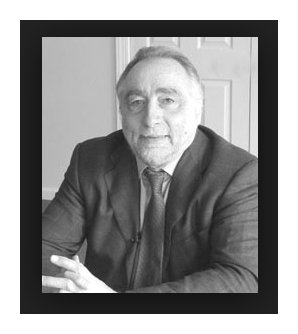

| Harvey Sollberger, born May 11,
1938, in Cedar Rapids, Iowa, is a composer, conductor and flutist who has
been active in many world musical centers. Sollberger holds an M.A. degree from Columbia University, where his composition instructors included Jack Beeson and Otto Luening. In 1962 he co-founded (with Charles Wuorinen) The Group for Contemporary Music in New York City, which he directed for 27 years, and from 1997 to 2005 he served as Music Director of the La Jolla Symphony and Chorus. An emeritus professor of music at the University of California, San Diego, he also taught at Columbia University, the Manhattan School of Music, and Indiana University. Performers of his music have included the New York Philharmonic, the San Francisco Symphony, Tanglewood, June in Buffalo, Interlink (Tokyo), Radio France and Pierre Boulez's Domaine Musical (Paris), TRANSIT (Belgium) and Incontri di Musica Sacra Contemporanea (Rome). His honors include the Award of the National Institute of Arts and Letters, two Guggenheim Fellowships and commissions from the Fromm, Naumberg and Koussevitzky Foundations, Music from Japan, Speculum Musicae, the New York New Music Ensemble, the NEA and various state arts councils. His orchestra performing credits include appearances with the San Francisco Symphony, the San Diego Symphony, the New York Philharmonic, the Buffalo Philharmonic, the June in Buffalo Chamber Orchestra and the Slee Sinfonietta. Harvey Sollberger has toured and recorded extensively, and his work as composer and performer is represented on over 130 commercial recordings. Numbered among his premieres are works by Babbitt, Carter, Davidovsky, Felder, Martino, Perle, Reynolds and Wuorinen, and the American premieres of music by Feldman, Holler, Risset, Scelsi, Schnittke, Stockhausen, Tiensuu and Xenakis. He has, in addition, been Resident Composer at the American Academy in Rome and Composer-in-Residence with the San Francisco Contemporary Music Players and Red Cedar Chamber Music. In his spare time Harvey Sollberger studies Italian, and has recently translated the autobiography of Italian flutist, Severino Gazzelloni. He currently lives in Iowa. -- Note: Names which are links refer
to my interviews elsewhere on this website. BD
|
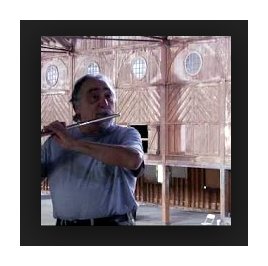 HS: Generally old pieces, but even with newer pieces
there seems to be a timidity about going beyond some of them
— like the Berio
Sequenza or Edgar Varese’s Density 21.5. As wonderful as they
are, I’ve always tried to encourage my students to try some things they don’t
know anything about.
HS: Generally old pieces, but even with newer pieces
there seems to be a timidity about going beyond some of them
— like the Berio
Sequenza or Edgar Varese’s Density 21.5. As wonderful as they
are, I’ve always tried to encourage my students to try some things they don’t
know anything about.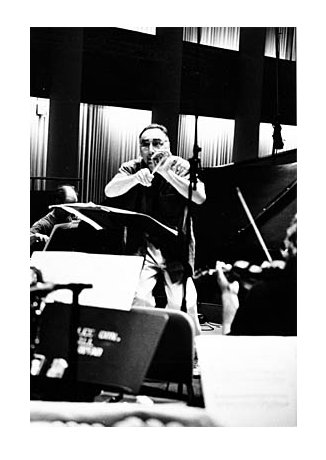 BD: How does all of this change when you are conducting
music that you, yourself, have written?
BD: How does all of this change when you are conducting
music that you, yourself, have written?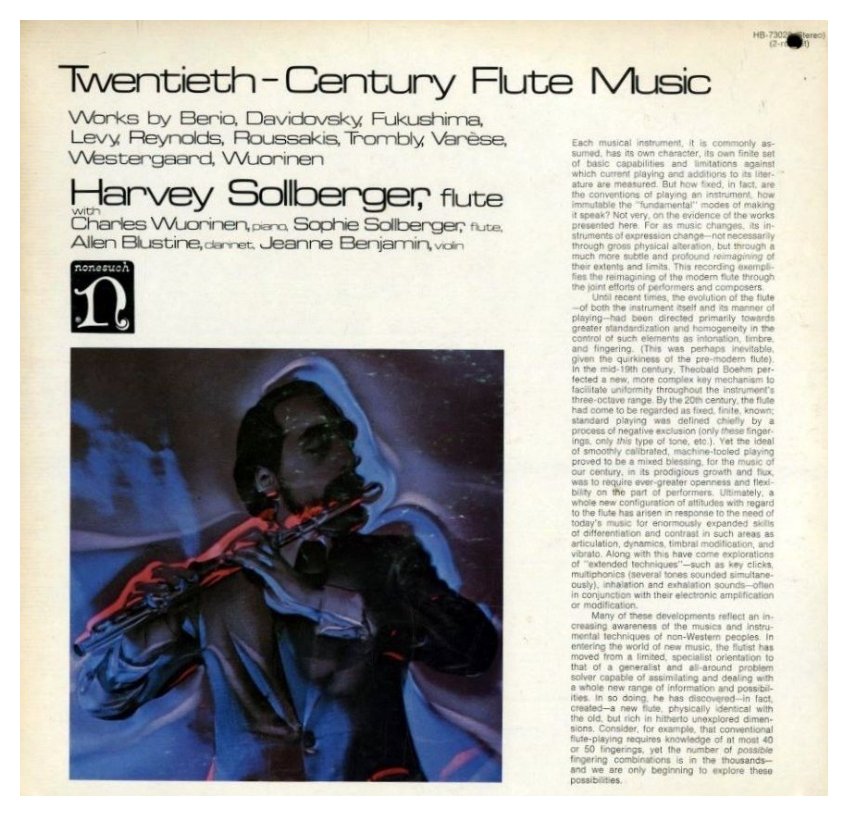
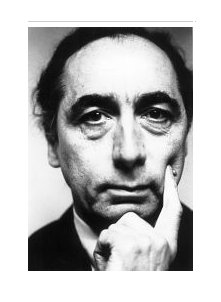 HS: That’s a tantalizing question. In a certain
sense, I’m not sure I’m creating anything. I feel, very often, that
what I’m doing reflects certain processes that exist and go on in the universe.
I, as part of the universe, participate in all of this, and as I perceive
and process information and influences, I’m not so much creating something
new as perhaps creating metaphors, almost poetic metaphors or musical processes,
that mirror or suggest processes that go on, on another scale, maybe even
a cosmic scale. In one sense, I’m not very close to the 19th century
composer, who was always concerned with I, I, I, me, me, me — the idea of
self-expression. I don’t think I’m expressing myself that much.
There’s nothing wrong with that, but I feel it’s possible for a composer to
be a conduit, or a channel or channeler for processes that go on in the universe
that are not particularly personal, that are rather super-, or supra-personal.
At times I have the feeling that I’m in touch with such processes, or that
they’re working through me or working through my music, and this leads to
a loss of ego. A lot of the time we’re trapped in the persona we enact
in the world. I have this role of professor; I have this role of composer
or performer; I have a role as a father; I have various roles that I enact,
and at times it’s necessary to break down those walls and to see the stars
that lie beyond them. Many people live their lives totally engulfed
in those roles. For me, it’s necessary to climb up and look over the
fence... or to try to, anyway.
HS: That’s a tantalizing question. In a certain
sense, I’m not sure I’m creating anything. I feel, very often, that
what I’m doing reflects certain processes that exist and go on in the universe.
I, as part of the universe, participate in all of this, and as I perceive
and process information and influences, I’m not so much creating something
new as perhaps creating metaphors, almost poetic metaphors or musical processes,
that mirror or suggest processes that go on, on another scale, maybe even
a cosmic scale. In one sense, I’m not very close to the 19th century
composer, who was always concerned with I, I, I, me, me, me — the idea of
self-expression. I don’t think I’m expressing myself that much.
There’s nothing wrong with that, but I feel it’s possible for a composer to
be a conduit, or a channel or channeler for processes that go on in the universe
that are not particularly personal, that are rather super-, or supra-personal.
At times I have the feeling that I’m in touch with such processes, or that
they’re working through me or working through my music, and this leads to
a loss of ego. A lot of the time we’re trapped in the persona we enact
in the world. I have this role of professor; I have this role of composer
or performer; I have a role as a father; I have various roles that I enact,
and at times it’s necessary to break down those walls and to see the stars
that lie beyond them. Many people live their lives totally engulfed
in those roles. For me, it’s necessary to climb up and look over the
fence... or to try to, anyway.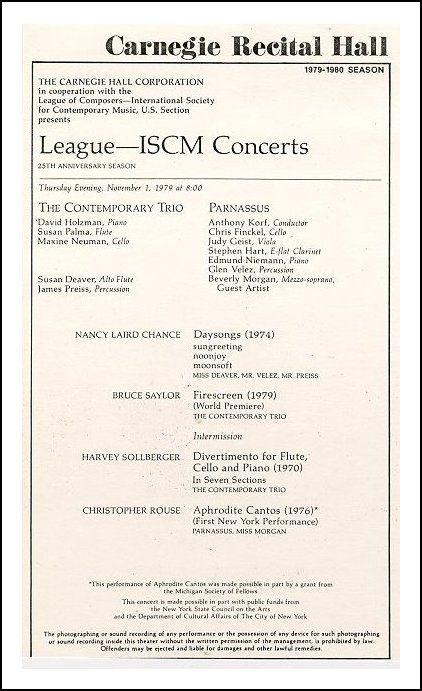 HS: In their own way, which might be very different
from my way, but I don’t know that I expect them to. I hope that they
will. I hope that somehow the musical experience, whether it’s my
music or someone else’s that I might be conducting, will trigger associations
and insights, and will perhaps release energies that otherwise might not
have been touched or affected. Art is something — you
let it loose out in the world, and nobody can predict what its result or its
effect will be. It’s like an old joker; it’s a wild card. It
would be insane of me to prescribe or expect that something I write or create
is going to have a particular effect on people. It may have this effect
on one person, and another effect on another. In fact, somebody might
hear a piece of mine and dislike it, or not be affected by it, and then five
years later have an experience that causes the experience of that piece they
had before to fall into focus. I’ve certainly had that experience at
certain points of my life — hearing music that I just
didn’t get and didn’t like and didn’t want to hear, and years later hearing
it again and saying, “Oh, yeah! Of course.” The music hadn’t
changed; I had changed. This is one of the compensations of getting
older — that you have this chance to come back to certain
experiences and perhaps to see that, in the meantime, you become better able
to make sense of certain things.
HS: In their own way, which might be very different
from my way, but I don’t know that I expect them to. I hope that they
will. I hope that somehow the musical experience, whether it’s my
music or someone else’s that I might be conducting, will trigger associations
and insights, and will perhaps release energies that otherwise might not
have been touched or affected. Art is something — you
let it loose out in the world, and nobody can predict what its result or its
effect will be. It’s like an old joker; it’s a wild card. It
would be insane of me to prescribe or expect that something I write or create
is going to have a particular effect on people. It may have this effect
on one person, and another effect on another. In fact, somebody might
hear a piece of mine and dislike it, or not be affected by it, and then five
years later have an experience that causes the experience of that piece they
had before to fall into focus. I’ve certainly had that experience at
certain points of my life — hearing music that I just
didn’t get and didn’t like and didn’t want to hear, and years later hearing
it again and saying, “Oh, yeah! Of course.” The music hadn’t
changed; I had changed. This is one of the compensations of getting
older — that you have this chance to come back to certain
experiences and perhaps to see that, in the meantime, you become better able
to make sense of certain things.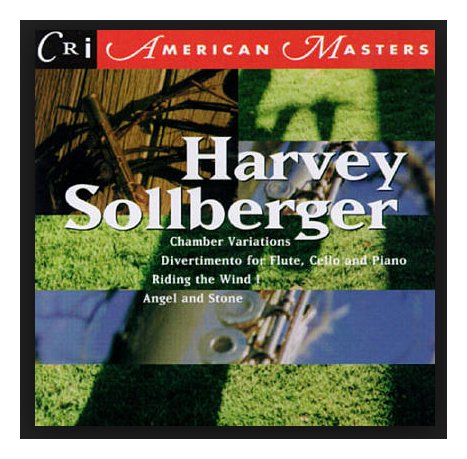
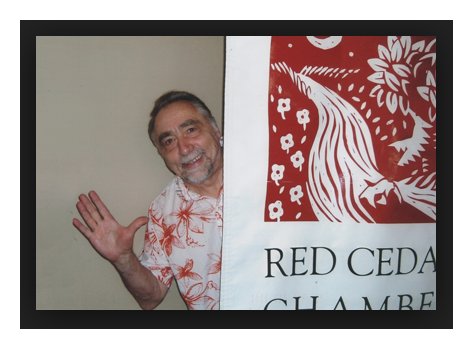 BD: Where do you think music is going these days?
BD: Where do you think music is going these days?
© 1994 Bruce Duffie
Photos are from harveysollberger.com, and elsewhere on the internet.
This conversation was recorded in Chicago on January 21, 1994.
Portions were broadcast on WNIB the following year, and again in 1998, and
on WNUR in 2006 and 2011. A copy of the unedited audio was given to
the Archive of Contemporary Music
at Northwestern University.
This transcription was made in 2014, and posted on this website at that time.
To see a full list (with links) of interviews which have been transcribed and posted on this website, click here. To read my thoughts on editing these interviews for print, as well as a few other interesting observations, click here.
Award - winning broadcaster Bruce Duffie was with WNIB, Classical 97 in Chicago from 1975 until its final moment as a classical station in February of 2001. His interviews have also appeared in various magazines and journals since 1980, and he now continues his broadcast series on WNUR-FM, as well as on Contemporary Classical Internet Radio.
You are invited to visit his website for more information about his work, including selected transcripts of other interviews, plus a full list of his guests. He would also like to call your attention to the photos and information about his grandfather, who was a pioneer in the automotive field more than a century ago. You may also send him E-Mail with comments, questions and suggestions.